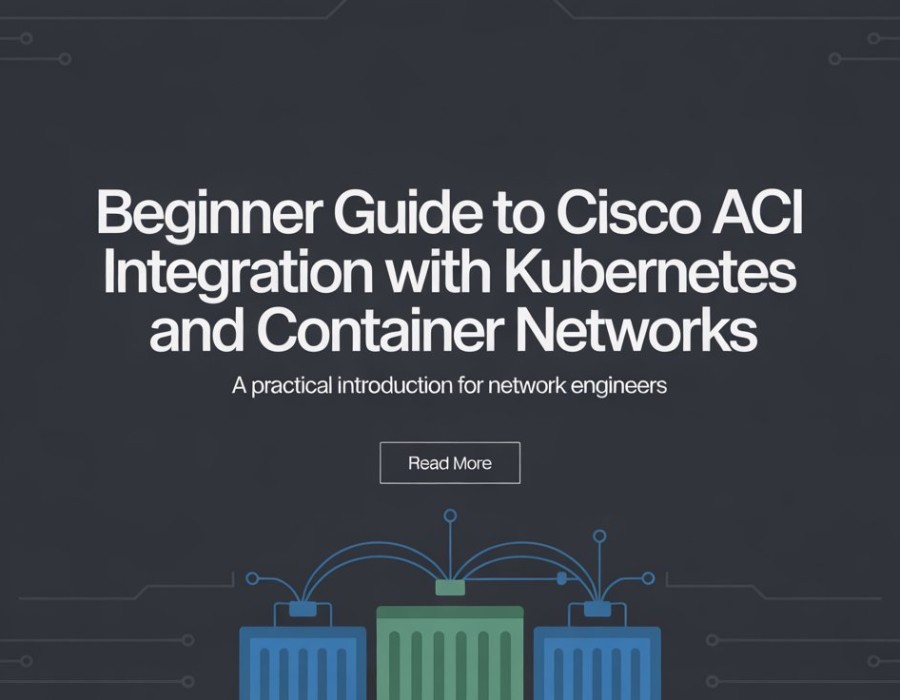Introduction
For anyone starting their networking career, Cisco ACI Training provides a strong foundation in modern data center technologies. With businesses adopting containerized applications and Kubernetes, understanding how Cisco ACI integrates with these environments has become essential. Cisco ACI (Application Centric Infrastructure) allows network engineers to manage, automate, and secure data center networks efficiently. By learning this integration through Cisco ACI Training Online, beginners can gain practical skills that prepare them for real-world networking challenges.
Understanding Cisco ACI Architecture
Cisco ACI is designed to simplify data center networking by using a policy-driven architecture. Its main components include the APIC controller, spine switches, and leaf switches. The APIC controller acts as the brain of the network, managing policies and configurations centrally. Spine and leaf switches provide a scalable network infrastructure for connecting servers, storage, and cloud resources.
By understanding Cisco ACI’s architecture, learners can see how traffic flows, how policies are applied, and how the system ensures reliability and scalability. Many beginners take Cisco ACI Course to get hands-on experience with these components and understand how to manage complex network environments.
What is Kubernetes and Container Networking
Kubernetes is an open-source platform for automating the deployment, scaling, and management of containerized applications. Containers package applications with their dependencies, making them portable and easy to deploy. In large enterprise environments, multiple containers often run across many servers, requiring a reliable network to connect them efficiently.
Container networking provides the mechanisms for communication between containers, both within the same host and across different nodes. Integrating this with Cisco ACI ensures that policies, security rules, and monitoring extend seamlessly from the traditional data center to containerized applications. Learners following Cisco ACI Training quickly understand how these integrations simplify network management.
Cisco ACI Integration with Kubernetes
Integrating Cisco ACI with Kubernetes allows network engineers to apply consistent network policies across both physical and virtual environments. Here are the key points of this integration:
- Policy-Based Networking – Cisco ACI uses endpoint groups and contracts to define how applications communicate, which can now include Kubernetes pods.
- Automation – By connecting Kubernetes clusters to ACI, policies can be automatically applied as containers are created or scaled.
- Security – Cisco ACI ensures that traffic between containers follows the defined rules, reducing the risk of misconfigurations or breaches.
- Visibility and Monitoring – Integration provides network visibility, allowing administrators to monitor container traffic alongside traditional workloads.
Completing a Cisco ACI Course or Cisco ACI Training Online helps learners practice this integration through labs, providing real-world experience before working in enterprise environments.
Importance of Cisco ACI Certification
For those looking to validate their skills, Cisco ACI Certification is a recognized credential that demonstrates proficiency in managing and integrating ACI with modern networks. It covers architecture, deployment, automation, and troubleshooting, making it an ideal complement to practical learning through Cisco ACI Training.
Obtaining certification increases career opportunities for freshers and networking professionals because organizations are actively seeking skilled individuals who can manage complex, hybrid environments that include both traditional and containerized workloads.
Learning Through Cisco ACI Training
Beginners benefit greatly from structured Cisco ACI Training, which provides hands-on labs and real-world scenarios. Training helps learners:
- Understand the ACI architecture and policies
- Integrate ACI with Kubernetes and container networks
- Apply automation for network scaling and management
- Secure containerized applications in enterprise environments
By focusing on practical exercises, learners gain confidence in applying theoretical knowledge to live networks. Many also pursue Cisco ACI Training Online and a Cisco ACI Course to get structured guidance and prepare for Cisco ACI Certification exam
Conclusion
Integrating Cisco ACI with Kubernetes and container networks is a vital skill for anyone entering modern networking. Beginners can build a strong foundation through Cisco ACI Training Online, gaining hands-on exposure to core concepts and practical workflows. Additional structured learning via a Cisco ACI Course helps learners connect theory with real-world scenarios, enhancing their understanding of ACI architecture and integration.
Those who pursue Cisco ACI Certification after training gain recognition for their skills, improving career opportunities and positioning themselves as capable professionals in modern data center environments. Whether you are a fresher starting your journey or an experienced professional upgrading your knowledge, mastering this integration lays the groundwork for a successful networking career.





Comments